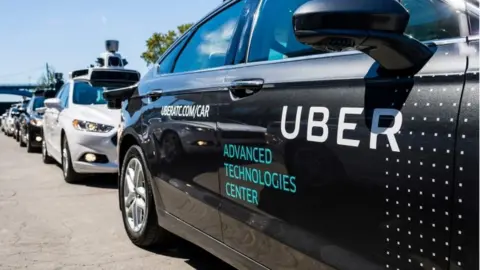Uber halts development of self-driving trucks
 AFP/Getty
AFP/GettyUber has said it will stop developing self-driving trucks to focus its autonomous technology solely on cars.
Uber's self-driving truck programme started in 2016 with a team based in San Francisco.
The ride-hailing firm marked the world's first commercial shipment delivered by a self-driving truck later that year.
The truck drove 120 miles (193 km) along a highway in Colorado with a trailer full of Budweiser beer.
The idea behind self-driving trucks was initially to improve the safety and efficiency of the trucking industry, according to Uber's Advanced Technologies Group (ATG) website.
"We believe having our entire team's energy and expertise focused on [self-driving cars] is the best path forward," ATG head Eric Meyhofer said in a statement.
The company did not immediately respond to further questioning from the BBC.
Uber Freight, which matches mostly owner-operator truck drivers with shippers, will be unaffected by the move.
Uber's self-driving car development has not been without problems.
In March, the firm said it was suspending self-driving car tests in all North American cities after a fatal accident.
A 49-year-old woman was hit by a car and killed as she crossed the street in Tempe, Arizona.
The fatal accident came a year after Uber pulled self-driving cars from the roads after another accident which left one of the vehicles on its side.
A handful of Uber's self-driving vehicles have just been put back on the roads in Pittsburgh following the March suspension.
Self-driving cars have been hailed as the future of the ride-hailing industry as well as a way to reduce traffic accidents.
Other companies including Ford, General Motors, Mercedes-Benz owner Daimler and car supplier Bosch are investing in the development of self-driving vehicles.
However, there have been warnings that the technology is being deployed before it is ready.
